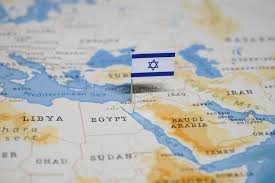The State of Israel is relatively small in comparison to most countries. It is located on the Eastern end of the Mediterranean Sea, just north of Egypt. Just how small is it? Compared to an American state, it is roughly the size of New Jersey.
It borders Lebanon to the West and Syria to the east on its northern border. Jordan lies on Israel’s eastern border, and to the country’s southeast is a part of the Red Sea, commonly referred to as The Gulf Of Aqaba (after the Jordanian city which lies next to the Israeli town of Eilat) and in the southwestern past is Egypt's Sinai desert.
The state has a population of more than 9 million people. As a ‘Jewish State,’ the demographic makeup of Israel is 74% Jewish, 21% Arab, and 5% classified officially as ‘other,’ including Greek Orthodox, Roman Catholic, & Bahai. Israel is a free country in terms of human rights. There is freedom of speech, an independent press, and a judicial system often seen as leaning liberal. There is jurisprudence, and those accused of crimes have rights.
Israel’s political structure is parliamentarian. The primary body called ‘The Knesset’ has 120 members elected by the population once every four years or when a governing coalition is not viable and collapses. The Knesset elects a Prime Minister to form the government; usually, it is the leader of the largest party. However, there are times when the Prime Minister is from a party that has few seats but is seen as being able to unite a wide variety of factions to create a coalition that is considered genuinely democratic and representative of the population.
Israel’s economy is driven by a vibrant High-Technology sector, covering innovation in everything from electronics, computers, medical equipment, and food laboratories. Its Agricultural industry is considered one of the best globally, having pioneered drip irrigation and mastered seed splicing to develop fruits and vegetables that can thrive in the arid climate—manufacturing rounds out the top three industries. The vibrant Diamond industry and Tourism make up the top five.
Innovation is a staple in Israel. In industry, according to Bloomberg, Israel ranks seventh in technological breakthroughs. In medicine, Israel ranks fifth according to the World Index of Medical Innovation. From the first 3-D printed heart to the Pillcam to cutting edge ‘bloodless’ surgeries, Many medical breakthroughs have come out of the tiny nation. Israel has several universities ranked in the top 100, including Jerusalem’s Hebrew University, Haifa’s Technion, and Rehovot’s Weizmann Institute, with Ben Gurion University in The Negev seen as one of the foremost universities for Agricultural sciences in the world. Israel’s hospitals are considered among the world’s best, with six hospitals appearing in Newsweek’s ‘The World’s Top Hospitals,’ four in the top 100.


